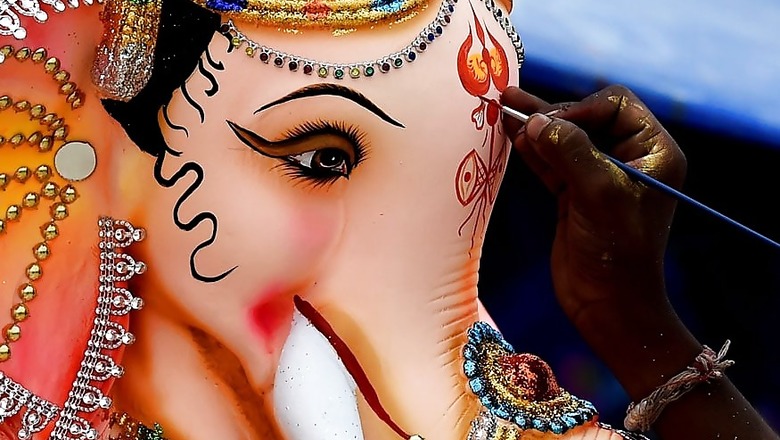
views
Ganapati, the other name for Lord Ganesha means the lord of lords. Each and every part of the idol of this elephant deity is a representation, a symbolism of something deep.
Not many of us would be aware about what symbolism a Ganesha’s idol holds. With time, the knowledge about the true meaning behind his postures, his representation has started to diminish.
On the auspicious occasion of Ganesh Chaturthi, we bring you the significance of the Lord Ganesha’s idol that is welcomed with pure love and joy and installed in every household. As we celebrate this festival, it is important for us to carry the wisdom of knowledge ahead.
Big head
The big head of elephant on a human’s body is a symbolism of thinking big. Elephant has the largest brain out of all the land animals and is worldwide accepted to be the most intelligent of all. Not only is an elephant known for its intelligence but also much appreciated for its wisdom, determination and power.
Small eyes
Elephants usually have small eyes that represent concentration. The fact that they are able to see things bigger than what they actually are teaches us to always see the bigger picture and not be lead by misleading sights.
Large ears
Elephants are known for their remarkable sense of hearing. The large ears are not only a symbolism of listening more but also to filter out unnecessary stuff.
Trunk
The pliable trunk in the idol is a symbolism of adaptability. It teaches us to be flexible in various different situations and act accordingly. A beautiful fact about elephant’s trunk is that it can do versatile actions; play and destroy, both.
Two tusks
The life is full of conflict of choices; right and wrong, emotional and practicality etc. The two tusks represent these two choices. The broken tusk teaches us to rise above odds and make right decisions in all ventures of life.
Big stomach
It is a symbolic representation of celebrating life. It teaches us to absorb all the good and bad in life and rise above them, no matter what the circumstances are.
Modak
If you ever try and notice the idol, you will see Modaks too. These are nothing but sweets, a form of reward (prashad) for spiritual pursuit.
Mouse
The mouse, who is better known as Ganesha’s carrier, represents a lot of human attributes. First and foremost, it represents the desires we all are crowded with. It teaches us to control our desires or else they might end up destroying us. Another thing that the little mouse sitting at Ganesha’s feet represents is that nobody should be egoistic. Ganesha, or god is the supreme power. The fact that a mouse is able to carry Ganesha everywhere teaches us to stay determined and overcome all the obstacles that we may come across in our lives.
Posture
Even the idol’s posture has lessons to teach us. Usually, Ganesha ji sits with one leg folded and with other on the ground. It holds the most significant lesson. It teaches us to aim for the sky, but still remain rooted to our basics.
Four hands
An intriguing fact about the idol is that all the 4 hands of Lord Ganesha is seen in different poses and hence representing different things.
One hand is seen holding the hatched or axe; it represents old deeds, both and good and be cut when a person becomes enlightened. Another is seen holding a lotus that represents awakening. Yet another hand is seen blessing the people and wishing the best for everyone. The last one holds a rope, a symbolism of pulling away from materialistic things and getting closer to the ultimate goal.


















Comments
0 comment